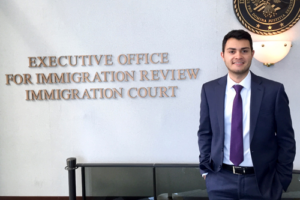This website uses cookies
We use cookies to ensure that we give you the best experience on our website. If you continue to use this site we will assume that you are happy with it.

Clinic students have an opportunity to argue in immigration court.
In late 2015 three teams of Cornell Law clinic students, poised to represent their clients at the immigration court in Buffalo, New York, were turned away. The judge denied the teams’ motions to appear in court, citing, in two of the cases, interpreter problems that were slowing down the docket; his implication was that allowing students to argue cases would cause further delay. The students did not give up. As the teams continued to advocate for their clients, the Erie County Bar Association filed an interlocutory appeal on their behalf, and dozens of clinicians submitted an amicus brief in support. This February, in an unprecedented move, the Board of Immigration Appeals (BIA) ordered that the students be permitted to practice in court.
A number of federal rules permit students to practice in court under attorney supervision. Cornell’s Advocacy for LGBT Communities Clinic and Farmworker Legal Assistance Clinic are among the Law School’s many clinics that invoke these rules, both to give students hands-on experience and to provide vital support to clients who would not otherwise have access to legal representation. Both clinics were involved in the Buffalo Immigration Court cases.
In the fall semester, LGBT Clinic participants Nicole Gonzalez ’17 and Dustin Lee ’16 were preparing for a high-stakes evidentiary hearing in their client’s asylum case when their motion was denied by the immigration judge. Then, on the day of the hearing, the court continued the case to the next year, when Gonzalez and Lee would no longer be participating in the clinic; therefore, despite the BIA’s decision, their client will not have them by his side in court. Their case will be taken on by a new team of students.
“Nicole and I worked many hours throughout a number of weeks to prepare for our case,” says Lee. “We became committed to the case both intellectually and emotionally. So it was a great disappointment when the immigration judge chose to deny our motion to practice before him, especially without giving any reason. I was delighted to hear that the BIA, which usually does not entertain interlocutory appeals, overturned the Immigration Judge’s decision. Clinics are an integral part of the representation of the disenfranchised and indigent, and it’s heartening to see the BIA recognize the hard work of clinic students everywhere.”
Also denied the chance to represent her client in court was Farmworker Clinic student Maria Gaige ’16. Her client continues to receive representation through the clinic, now by students Will Pellett ’17, Mario Roque ’17, and Brianna Stellpflug ’16. Following the BIA decision, their entries of appearance have been granted, and Pellett appeared on the client’s behalf in March.
Fellow Farmworker Clinic students Benjamin Einhouse ’17 and Sarah Estabrook ’17 did have a chance to see their case through from the fall into the spring semester. Their client, “Josue,” is a seventeen-year-old who, due to dangerous conditions and dire poverty, was sent to the United States from Guatemala by his parents. Initially detained by the Department of Homeland Security, he was released to the care of his uncle, who lives in farmworker housing in rural New York, as his deportation proceedings continued. The Worker Justice Center of New York sought to assist Josue but had trouble finding a lawyer to represent him, and he was on the verge of deportation when the Farmworker Clinic took his case.
Einhouse, Estabrook, and interpreter Diego Echeandia ’17 made several six-hour round-trip drives to meet with Josue and coordinate with his uncle, his new school, his housemate, his family, the dairy owner who employed his uncle, and local service providers. Einhouse and Estabrook were standing in court, ready to present on their first day, when the judge denied them entry of appearance. As they awaited the interlocutory appeal, they continued to work for their client, obtaining a custody order in county court to aid his progress toward legal residency while repeatedly submitting motions to the Immigration Court to delay deportation proceedings. They never did get to represent Josue in court, but only because their motions succeeded: in February the court terminated removal proceedings to allow Josue to focus on obtaining his visa.
“If he succeeds, Josue will have the right to apply to adjust his status to that of a permanent resident, giving him a clearer path out of poverty,” says Beth Lyon, clinical professor and director of the Farmworker Legal Assistance Clinic.
Of the BIA’s decision to grant the clinics’ interlocutory appeals and allow the students to represent their clients in court, Lyon says, “The Board of Immigration Appeals had never spoken on this issue, and we’re delighted to receive decisions that express such strong support for the importance of student practice in removal proceedings. Our clients are typically people who have experienced significant trauma in addition to having little opportunity for formal education. We owe them the support Cornell Law students provide as well as the expertise they bring to the process. The courts will not provide lawyers for indigent people in removal proceedings, not even for children. In the face of the unexpected disallowance of their participation, the students responded with commendable professionalism and zeal, ensuring their clients were protected.”